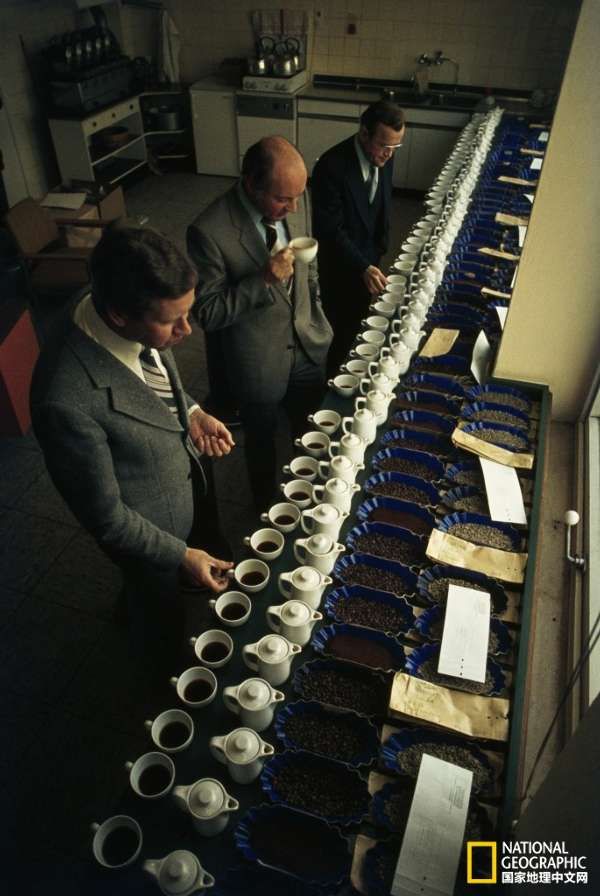The black history of caffeine: a good medicine

Close-up: coffee poured into a glass Photography: national Geographic Sam Abell article: Rebecca Rupp this past March is caffeine Awareness month. Depending on your reading material, you may start drinking coffee, or you may drop the coffee and drink juice or herbal tea instead.
Caffeine, though not the coolest thing, is the most popular psychotropic drug in the world. People have been addicted to caffeine for more than 5000 years since the legendary Shennong discovered natural caffeine-containing tea.
According to Murray Carpenter's comprehensive book Caffeinated, ancient Mexicans got the excitement of caffeine from cocoa beans at least 3,500 years ago; according to Ethiopian legend, coffee appeared at least in the 9th century: a shepherd named Kaldi found that sheep became extremely active after eating a mysterious red berry. So he ate a little himself and found that coffee had the same effect on the human body.
About 90% of Americans eat caffeine every day in different forms: chocolate, tea, coffee, carbonated drinks, energy drinks and so on. Incredibly, Dunkin' Donuts and Starbucks together sell 26 million cups of coffee a day, enough to fill four Olympic standard swimming pools. Around the world, we drink 20000 bottles of Coca-Cola per second, or 17 billion bottles a day.
To meet our strong demand for caffeine, the United States exports about 3.5 million tons of coffee beans and 285 million tons of tea every year. Looks like we're going to pour a lot of caffeine into our sewers.
About 60 different plants produce caffeine, and caffeine acts as an insecticide in nature, protecting plants from pests. In humans, caffeine has other effects: it boosts our spirits, improves our mental and physical expression, reduces our reaction time, enhances our short-term memory, helps us concentrate, and makes us feel energetic.
The tasters are tasting all kinds of coffee before determining the mix of coffee drinks.
Caffeine has helped countless generations of candidates during the stressful exam season and has long been considered to be a substance that increases physical endurance. For example, Xizang, who likes to drink tea, will feed tea to mules and horses before embarking on a difficult journey, and the length of the journey will even be calculated in terms of the number of cups of tea: the distance of three cups of tea is about 8 kilometers. Humans are not the only animals that have discovered this effect. Bees remember plants that contain caffeine in their nectar for longer.
Athletes also like caffeine, which is often touted as the most popular and performance-enhancing drug in the world. Caffeine suppresses fatigue, makes people stronger and faster, and, with the icing on the cake, it's legal. In a 2009 review of 21 studies on the relationship between caffeine and time trial, researchers found that caffeine enhanced athletes' performance, from running to boating, cross-country skiing and cycling. In some cases, caffeine increases performance by 3%-enough to determine the success or failure of athletes in some time-tight competitions.
Similarly, soldiers on the battlefield must stay awake, concentrate and move quickly, and they will perform better after consuming caffeine. The army provides caffeine to soldiers through a range of materials that have been tested on the field. for example, the army equips pilots with military energy chewing gum (which contains 100 milligrams of caffeine each. (about the amount of a cup of coffee), caffeinated energy bars and caffeinated canned foods.
However, faster, stronger, smarter and more dynamic, all of the benefits of coffee come at a price. One of the most obvious side effects is affecting sleep: caffeine, which keeps us awake, can also make us sleep less. Instead of interfering with REM sleep like alcohol, caffeine interferes with the third and fourth stages of sleep, of which we get the most rest and recover our strength. The end result may be a vicious circle in which drowsy people eat more caffeine during the day to stay awake, while it becomes harder to fall asleep at night.
On the other hand, everyone reacts differently to caffeine. Generally speaking, the "half-excretion period" of caffeine in the human body is about 5 hours, that is, it takes about 5 hours to expel 50% of the caffeine from the human system.
However, the rate at which caffeine is metabolized in the body depends on weight, heredity, lifestyle, and even whether you have lunch or not. For example, women who are taking contraceptive metabolize caffeine for longer, so they get more stimulation from the same cup of coffee or caffeinated soda; on the other hand, smokers metabolize caffeine twice as fast as normal people, so they get less stimulation. Cruciferous vegetables, such as cabbage and cauliflower, increase caffeine metabolism, while umbellid vegetables, such as celery and carrots, slow caffeine metabolism and make it last longer.
Some studies have even found that the rate of caffeine metabolism has something to do with a person's personality: you can tell whether you are a social expert or an introverted nerd. The study found that extroverted personality achieved more cognitive improvement than introverted personality. Caffeine also has different effects on people of different time types (time type, or chronotype, such as what time you get up in the morning). Larks generally get up early and are therefore more sensitive to the sleep-disrupting effects of caffeine, while owls are not.
In the past three decades, there have been more than 19000 scientific papers on the role of caffeine. Many studies have shown that caffeine can reduce migraines, prevent depression, reduce the risk of type 2 diabetes, heart disease and some cancers, avoid Parkinson's and Alzheimer's disease, and may even prolong life.
In mice at least, caffeine protects subjects from multiple sclerosis.
The normal metabolism of the human body produces a harmful substance called free radical. If it is allowed to develop freely, it will cause damage to the body and cause DNA strands to break. Damaged DNA accelerates aging and increases the risk of cancer. Caffeine intake seems to prevent DNA strand breaks caused by free radicals.
However, the situation of caffeine is very confusing. Scientists are eager to point out that correlation does not necessarily mean causality. It's also possible that other molecules are at work. For example, coffee and caffeine contain many different compounds, including some known carcinogens.
Caffeine may have its benefits, but it also has a dark side. Just one spoonful of pure caffeine can kill you-if you want to achieve the same effect with coffee, you have to drink 50 cups full. To be more specific, caffeine can cause anxiety and unprovoked phobia in some vulnerable people, and, in the rarest and worst cases, can lead to complete paranoia.
On the other hand, historically, caffeine seems pretty good. Bach, Beethoven and Napoleon are all heavy caffeine consumers; so is Voltaire, who even claims to attribute his philosophy to coffee. Benjamin Franklin is also a big fan of coffee, claiming that coffee is "enjoyable without being poisoned", while the ever-energetic Teddy Roosevelt is said to drink a gallon of caffeinated drinks every day. Second, there is evidence that the concentration triggered by caffeine is not as awesome as it is touted. Sometimes, when you are a little distracted, you are more creative and problem-solving.
Having said so much, where is the bottom line for caffeine intake? Caffeine is complex, and obviously not everyone is supportive of it. At the same time, the American Medical Association recommends careful intake of 300 milligrams of caffeine a day, or two to three cups of coffee.
UP Coffee is an APP that monitors your caffeine intake. Be careful, however, that monitoring your intake is not as easy as it sounds.
The US Food and Drug Administration currently does not regulate caffeine in food and beverages because caffeine is currently in a "generally considered safe" state. However, if manufacturers add more and more caffeine to their foods and increase the amount of caffeinated drinks, then we should worry about the possible health effects of cumulative caffeine intake.
(mikegao)
Important Notice :
前街咖啡 FrontStreet Coffee has moved to new addredd:
FrontStreet Coffee Address: 315,Donghua East Road,GuangZhou
Tel:020 38364473
- Prev

Encounter the spark of literary and artistic feelings in the literary cafe
When you are in trouble, go to a cafe when you are in trouble of one kind or another. Austrian poets, who are used to writing in cafes every day, said so more than a hundred years ago. The cafe seems to have a strong literary amorous feelings from the day it was born. There are many literary cafes in Guangzhou, but they are generally kept in boudoir, around Xinhe Pu Road in Dongshan.
- Next

Do you know the origin of Roger's Cafe in London?
In 1650, Jacob, a Lebanese, opened Britain's first coffee shop near Oxford University, which was named Jacob Cafe, which was very popular with students. Two years later, businessman Yedworth met Roger in Turkey and invited Roger's business partner to go back to England to open a shop. When Roger saw Yedwartz indulge in the aroma of coffee every day, Min
Related
- How did the Salvadoran coffee industry develop in Central America?
- What exactly does the golden cup extraction of coffee mean?
- The Origin of Coffee flower
- [2023 Starbucks World Earth Day] there are more meaningful things besides free Starbucks coffee!
- What kind of coffee is there in Spain? 9 Flavors of Spanish Coffee
- Aromatic African coffee| Kenya's coffee culture and historical production area
- Liberica Coffee Bean knowledge: the characteristics of Liberian Coffee beans of the three original species of Coffee beans
- The origin and formula of Spanish latte introduces the taste characteristics of Bombon coffee in Valencia, Spain.
- How to adjust the solution of over-extracted coffee
- What is the tasting period of coffee beans? What is the period of coffee and beans? How should coffee wake up and raise beans?

